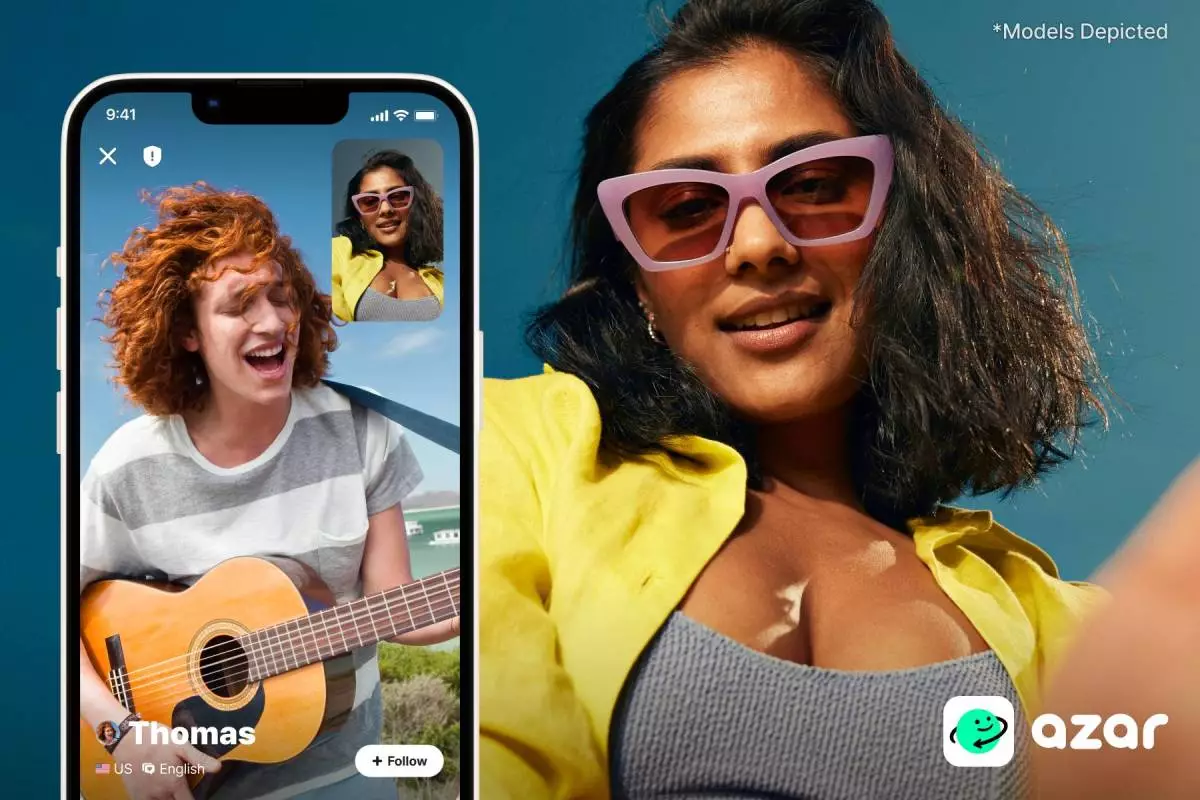Azar, an innovative application developed by Seoul’s Hyperconnect, has made headlines for facilitating over 100 billion video chats that connect users around the globe. Unlike conventional social media platforms, Azar creates spontaneous connections based on mutual interests rather than established relationships. The charm lies in its random pairing of strangers—a feature that could either lead to enriching conversations or awkward encounters. To this end, Azar has carved out a unique niche in the social networking landscape, particularly among Gen Z users who crave novel interactions unencumbered by the mundane nature of familiar social circles.
As it enters the U.S. market, Azar faces both a challenge and an opportunity. While the app roots itself in the tradition of random video chats, its arrival is marked by a backdrop of caution due to the notorious reputation of similar platforms. Historically, services like Omegle and Chatroulette have garnered attention for their unsavory content, often showcasing inappropriate behavior that leaves a bitter aftertaste for potential users. Yet, the landscape has changed; Azar aims to redefine safety standards through a combination of cutting-edge AI moderation and human oversight, presenting a different face of online interaction.
The digital phenomenon of loneliness has been exacerbated by the global pandemic, particularly among younger generations who increasingly turn to their smartphones for social engagement. Azar recognizes this growing need for connection, positioning itself as a remedy for social isolation. The app appeals to Gen Z users, who are often seen as more open to engaging with strangers online, possibly due to their comfort with social media dynamics. CEO Linda Kim emphasized this point, noting how the younger generation favors spontaneous, real-time conversations.
The allure of Azar is enhanced by its multilingual chat feature, automatically translating messages between different languages, thereby breaking down communication barriers. This innovation is particularly relevant in an increasingly globalized world where individuals are eager to discover new perspectives and cultures. By facilitating these cross-cultural exchanges, Azar not only fosters connections but also nurtures understanding—an essential component in a time marked by division.
A significant focus for Azar, as articulated by Kim, is the importance of user safety. In a world where digital interactions often come with risks, Azar has implemented a robust moderation system that uses a blend of AI and human intervention to filter out inappropriate content. Automated filters can swiftly identify and flag potential violations before human moderators step in for further action. This proactive approach aims to mitigate the risks associated with random video chats, helping to reclaim a space that has been haunted by negative experiences in the past.
The skepticism surrounding random chat applications understandably looms over Azar’s launch. However, the emphasis on maintaining a secure environment could serve as a powerful selling point, especially for users familiar with the app’s parent company, Match Group, which has a track record in the dating landscape with platforms like Tinder and OkCupid. Though Azar does not explicitly market itself as a dating app, its potential for romantic connections is a perfect by-product of its design.
Despite its innovative features, Azar must navigate the complexities of platform acceptance in the U.S. market. Users may still hold their breath, haunted by memories of past video chat experiences filled with discomfort or inappropriate exchanges. The challenge stems from changing perceptions while simultaneously building community and trust. To overcome this skepticism, proactive marketing that showcases safety measures, user testimonials, and success stories could help ease the minds of potential users.
Moreover, the app’s free-to-use model with in-app purchases presents opportunities for market penetration while catering to users’ diverse preferences. With personalized matching based on gender and geographical location, Azar is adept at creating a tailored experience that resonates with its core demographic. Kim’s understanding of the digital landscape and her ambition to provide meaningful interactions indicates a hopeful trajectory for Azar in the evolving realm of virtual connection.
The introduction of Azar to the U.S. signifies a pivotal moment in transforming how individuals communicate in the digital age. By countering loneliness and fostering connections through technology-driven safety measures, Azar stands poised to reshape user experiences in random video chatting. While challenges persist, the commitment to uplifting communal ties and addressing isolation will guide Azar as it seeks to establish a foothold in a marketplace laden with skepticism. The real question now is: will users give the app a chance to redefine their social interactions in a more meaningful, connected manner? The answer will shape Azar’s future in the dynamic world of social networking.

